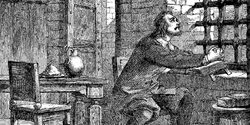
Imprisoned but Not Silenced
by Fred Zaspel
One of great ironies of Christian history occurred in the latter part of seventeenth-century England, in the little town of Bedford. Despite more than a century of attempts at reforming both church and state, the struggle for religious freedom had been long and hard in coming. A poor tinker (mender of pots and pans and such) named John Bunyan had recently begun to preach the gospel with uncommon effect. In increasing numbers the people began to give him a hearing, and it was evident to all that his preaching was greatly blessed of God.
But Bunyan was not part of the established church, and he was not properly licensed to preach. This didn’t matter to him, because it was under the orders of the Lord Christ that he preached the gospel. But it did matter to the authorities, and they demanded that he stop. Under orders by a higher authority, of course, he would not stop. He continued preaching with great effect. And for his crime of preaching the gospel without proper authorization, and in order specifically to keep him from preaching, Bunyan was locked up in the Bedford jail.
The irony of the story is that as a direct result of their shutting him up in prison his voice has been heard by more people than most any preacher in history. Not only did he preach often even while in prison to a very “captive” audience, but languishing there he turned to writing and produced many popular works of Christian literature. And among his many titles, begun it seems during his later imprisonment, is the renowned Pilgrim’s Progress, the most widely published book in all history, second only to the Bible itself.
We are told that Pilgrim’s Progress has been translated into more than two hundred languages, and it has passed through countless English editions, with millions of copies worldwide. It was a runaway best seller in his own day, it has been continuously in print ever since, and never before or since has a book ever been published that can rival it — the Bible only excepted. It has been a staple in Christian homes for three and a half centuries, and even in secular studies of literature it has been studied and hailed as the greatest allegory ever written. This from a man shut in prison in order to keep him from being heard.
I love this story, and preparing recently to teach again on Bunyan and his immortal classic I have been impressed once more with the wonders of divine providence. Bunyan was imprisoned more than twelve years, all told, in attempt to shut him up. And yet he still speaks. Indeed, not only does he still speak, few men in history have been heard more!
Of course, not all Christian suffering results in such obvious triumph. God’s providence is mysterious, and he has often allowed his children to suffer with little evident consequence. We trust him in either case. But it is encouraging indeed to be reminded how easy it is for God to give success to the gospel and accomplish the advance of his kingdom. Let the world do as it will, no one will ever stay his hand or frustrate his purpose (Dan. 4:34-35). He works all things according to the counsel of his own will (Eph. 1:11) — so infallibly, in fact, that even the wrath of man shall praise him (Ps. 76:10).
Such a God we can surely trust.
Fred Zaspel holds a Ph.D. in historical theology from the Free University of Amsterdam. He is currently a pastor at the Reformed Baptist Church of Franconia, PA. He is also an Adjunct Professor of Systematic Theology at Calvary Baptist Seminary in Lansdale, PA. He is also the author of The Continuing Relevance of Divine Law (1991); The Theology of Fulfillment (1994); Jews, Gentiles, & the Goal of Redemptive History (1996); New Covenant Theology with Tom Wells (New Covenant Media); The Theology of B.B. Warfield: A Systematic Summary (Crossway, 2010). Fred is married to Kimberly and they have two children, Gina and Jim.

